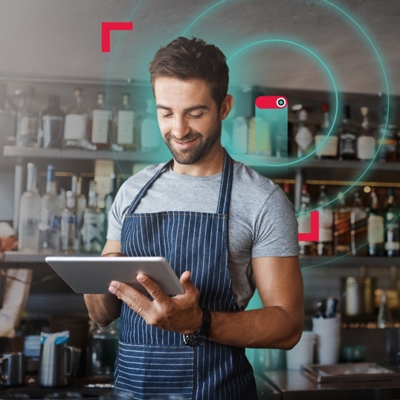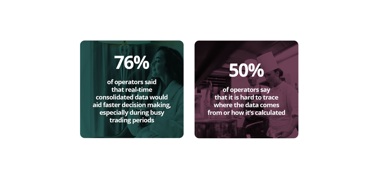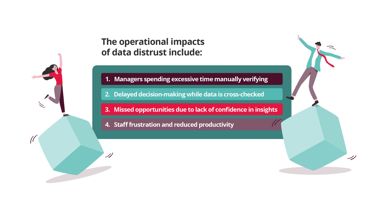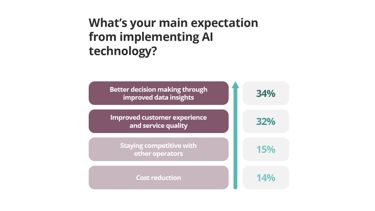2025 Report: AI in the Hospitality Sector
A look into how artificial intelligence is transforming hospitality operations and guest experiences. An exclusive sector report in collaboration with 1,000 businesses and 8,000 consumers across six international markets.
Key insights:
-
Businesses waste 286 hours per year (roughly 36 working days) switching between disconnected systems
-
13% of operational costs lost due to unconnected systems
-
57% of consumers say technology has significantly improved their hospitality experience
Read the full report to uncover how AI integration can reduce costs, save time and enhance guest satisfaction.

The hidden cost of disconnected systems
Our research found that hospitality businesses in the UK and Ireland waste an average of 286 hours a year switching between systems, and many can’t trust the data they receive from their current tools.
To better understand people’s attitudes towards AI within the hospitality space, and where it is falling short, Access Hospitality surveyed:
-
1,000 businesses currently operating in the hospitality sector
-
8,000 consumers 18+ across the UK, USA, DACH region, Australia, Indonesia and India
All respondents had recent experience dining out and staying in hotels, providing a fresh perspective on consumers’ views towards AI over traditional services.

Contents of this report
The systems problem
Systems proliferation
While a range of tools is essential in hospitality, too many disconnected systems can quickly become a drain on efficiency, adding cost and complexity rather than reducing it.
Our survey asked 400 hospitality businesses across the UK and Ireland how many systems they regularly use, and we found that in the UK, the average is four systems, whilst this increases to five in Ireland. The hotel sector also uses more systems than food and beverage, with hotels having an average of five systems in the UK and Ireland, whilst food and beverage use an average of four.

The time cost
A time waste epidemic
Despite many businesses utilising AI systems to improve their hospitality services, the majority admit to using multiple systems, costing them both time and money.
286 hours per person = 36 working days wasted every year
Regional Breakdown:
-
UK & Ireland (F&B): 250 hours lost per year
-
United States (F&B): 286 hours lost per year
Hoteliers in the UK and Ireland waste 322 hours per year switching between systems

The financial impact
Hidden cost drain
We know that 80% of hospitality businesses across the UK and Ireland are using multiple software systems, but how is this affecting costs?
13% of operational expenditure is wasted through unconnected systems alone
Average business losses on general operating costs:
-
UK: £15,000 per year
-
Ireland: £25,000 per year
-
Combined average: £20,000 per year
Industry breakdown:
-
Food-led venues: £30,000 lost vs
-
Drink-led venues: £15,000 lost

Data confidence crisis
Trust breakdown
Only 1 in 3 respondents are confident in the data they get from their current systems.
Operational impact of data distrust:
-
Managers spending excessive time manually verifying reports
-
Delayed decision-making while data is cross-checked
-
Missed opportunities due to lack of confidence in insights
-
Staff frustration and reduced productivity
76% of operators say real-time consolidated data would aid faster decision making during busy trading periods

Revenue impact
Over half (56%) of operators miss out on upselling opportunities because of stock shortages.
Industry breakdown:
-
Hotels: 60% cite stock as biggest recurring issue
-
Food & beverage venues: 52% report same problem
Three key problems from poor stock visibility:
-
Missed upselling moments – Guest orders premium drink (£15) but it’s unavailable, switches to cheaper option (£9)
-
Frustrated customers – Stock shortages lead to poor experiences and negative reviews
-
Lost event revenue – Unreliable stock damages trust and can lose bookings altogether
“We have to pull reports from one place to put into another to be able to run payroll for hundreds of people. If you’ve got to manually do that, that’s a lot of labour.”
Fragmentation leads to:
-
Manual data entry and duplication
-
Increased risk of errors
-
Wasted staff time and higher labour costs

AI adoption views
Leading ways hospitality businesses believe AI could benefit them in the next year:
-
Improving efficiencies: 45%
-
Streamlining bookings: 40%
-
Helping with routine tasks and reporting: 38%
“There are so many pros to AI. It can move and act quicker than I can possibly imagine. I can never match that. I can never beat that. That, for me, is genius.”
Hotel Director, UK
Consumer-business agreement:
-
32% of businesses expect AI to improve customer experiences
-
57% of consumers feel technology has significantly improved their experience
-
UK consumers favour tech services (53%) over US consumers (38%)
Over one-this of consumers think AI could create a better experience than staff in hospitality, yet 53% still prefer human interaction
35% of UK consumers say AI would create a better experience than staff, yet 53% still prefer human interaction

Introducing Access Evo
AI-integrated systems can save you time and money
Using the positive savings from the time it used to take switching between systems means that teams can actually focus on what matters most.
From confidence in stock levels to accurately forecasting footfall, Access EVO software transforms your everyday.

 AU & NZ
AU & NZ
 SG
SG
 MY
MY
 US
US
 IE
IE







